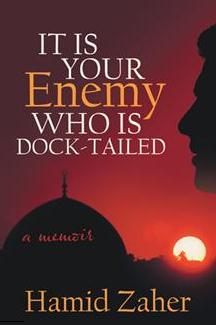How to untangle Hamid Zaher’s memoir, It Is Your Enemy Who Is Dock-Tailed? In the liberal pockets of North America, and especially within Canada, there are very specific definitions for such identities as homosexual, transsexual, homo, gay and transvestite. But Zaher is a native of Afghanistan, and he lived there until he was 27 before leaving to wander, as a displaced person, for about seven years.
Throughout his time in the Middle East, Zaher comes into contact with gay men, transvestites, transsexuals and men who have sex with men. Their understanding of these identities isn’t clear, or the ideas overlap. Homo can mean a shamefully sexless person or a pedophile; homosexual can mean the same, or someone who wears makeup or crossdresses – the same goes for transvestite or transsexual. Married “straight” men have sex with other men; gangs of them seek sex and then follow it up with violence. Others don’t understand, or ridicule, homosexuals.
Zaher is a fiercely intelligent, impossibly progressive and unbelievably brave homosexual man. Throughout It Is Your Enemy Who Is Dock-Tailed, his gender identity could be described as feminine, but he works construction and hard-labour jobs to survive. He is attracted to older, burly, hairy men, and at times he has crossdressed. His identity is admittedly not simple, but he states that the point of writing the memoir is to explain that similar queer identities exist, against all odds, in Afghanistan.
From the age of nine Zaher began to understand the environment of Afghanistan, and he explains that bullying, a pastime practised by illiterate farmers and university-educated intellectuals alike, is widely condoned. For instance, he recalls being at a marriage ceremony with some classmates when an extremely effeminate man walked into the room. As soon as the man spoke, those around him began laughing and whispering.
As Zaher points out, if this is how the educated behave, imagine what it’s like among the general population. Zaher’s journey involves a struggle with his manipulative, controlling mother. Later, when he seeks the help of the United Nations refugee agency, he becomes entrapped in a web of discrimination and corruption. Whether amongst his family, the UN bureaucrats, fellow refugees or countrymen, Zaher faces crippling isolation and fights a one-man war against oppression. Even after he finally makes it to Canada, he doesn’t quite escape – at least not at first.
It Is Your Enemy Who Is Dock-Tailed is dense and exhaustive. The trials Zaher faces and the pain he shares is not only distressing – it is emotionally draining.
English is not Zaher’s first language, so he sometimes stumbles finding the right words or phrases. Despite this, the narrative remains clear and easily comprehensible, and Zaher’s voice might be lost if an editor had made more drastic language revisions. This is, after all, Hamid Zaher’s story – through and through.
“Undoubtedly those who read my memoirs would feel sorry for me,” he explains. “But at least I have been able not to surrender to oppression and ignorance, and have been able to unveil the faces of stupid and cruel people who nurtured the idea of superiority in their heads. Thus one must feel sorry for the innumerable oppressed people, rather than me, who have no legs to escape and no voice to shout.”
It Is Your Enemy Who Is Dock-Tailed does not offer the reader a happy ending. It shows that even though there are gay Afghanis like Zaher, fortunate enough to live in relative safety, there are many more who remain trapped, as Zaher once was. Here’s hoping that Zaher, at least, has been able to find some peace.



 Why you can trust Xtra
Why you can trust Xtra


